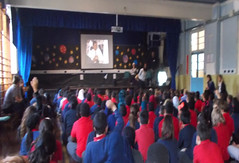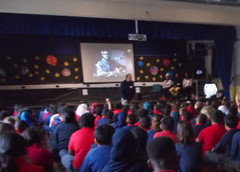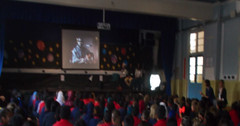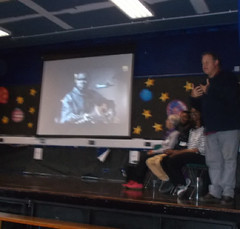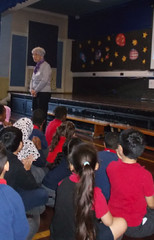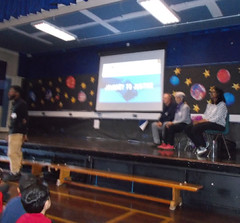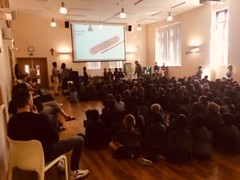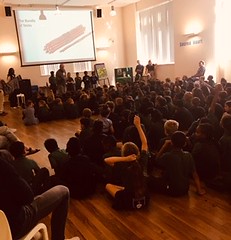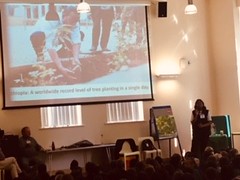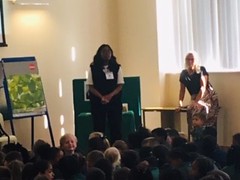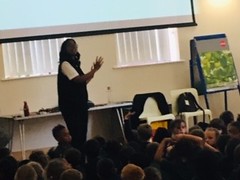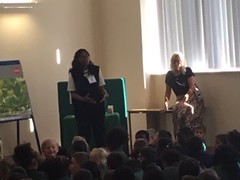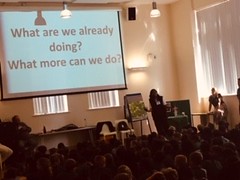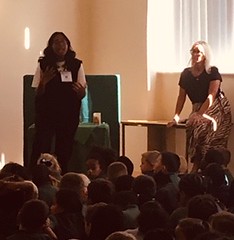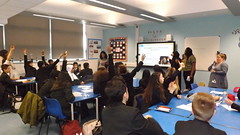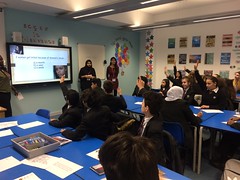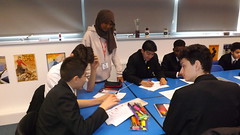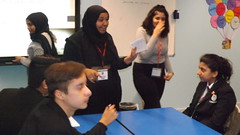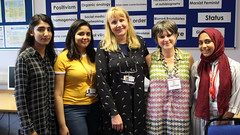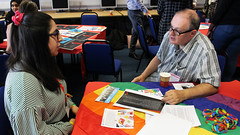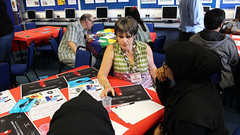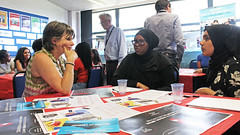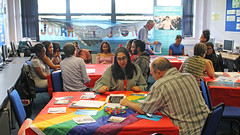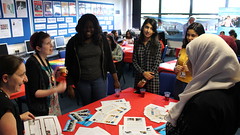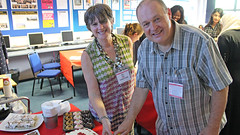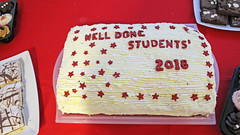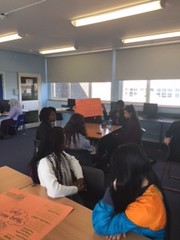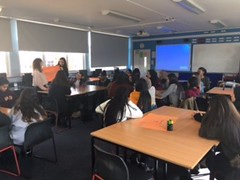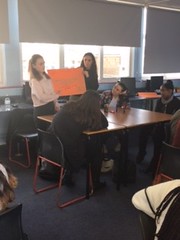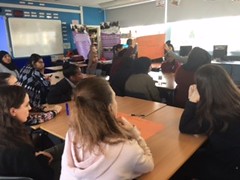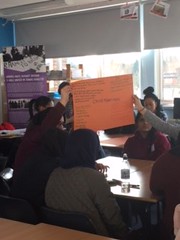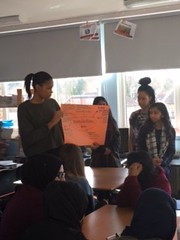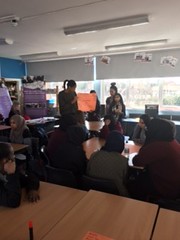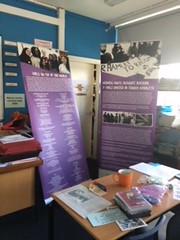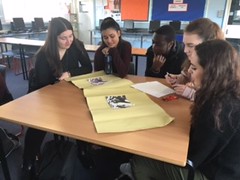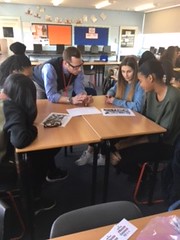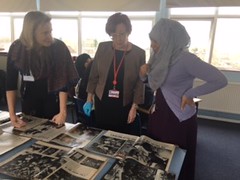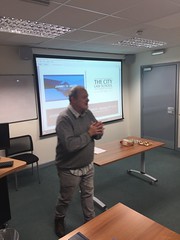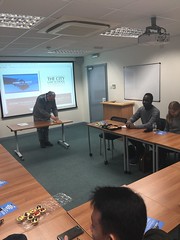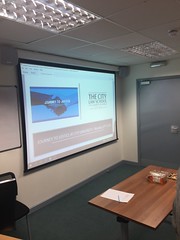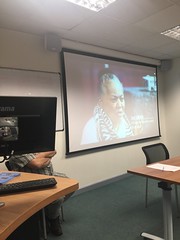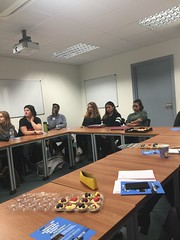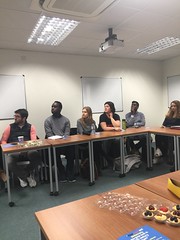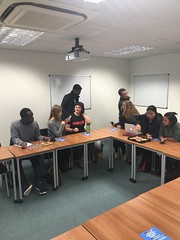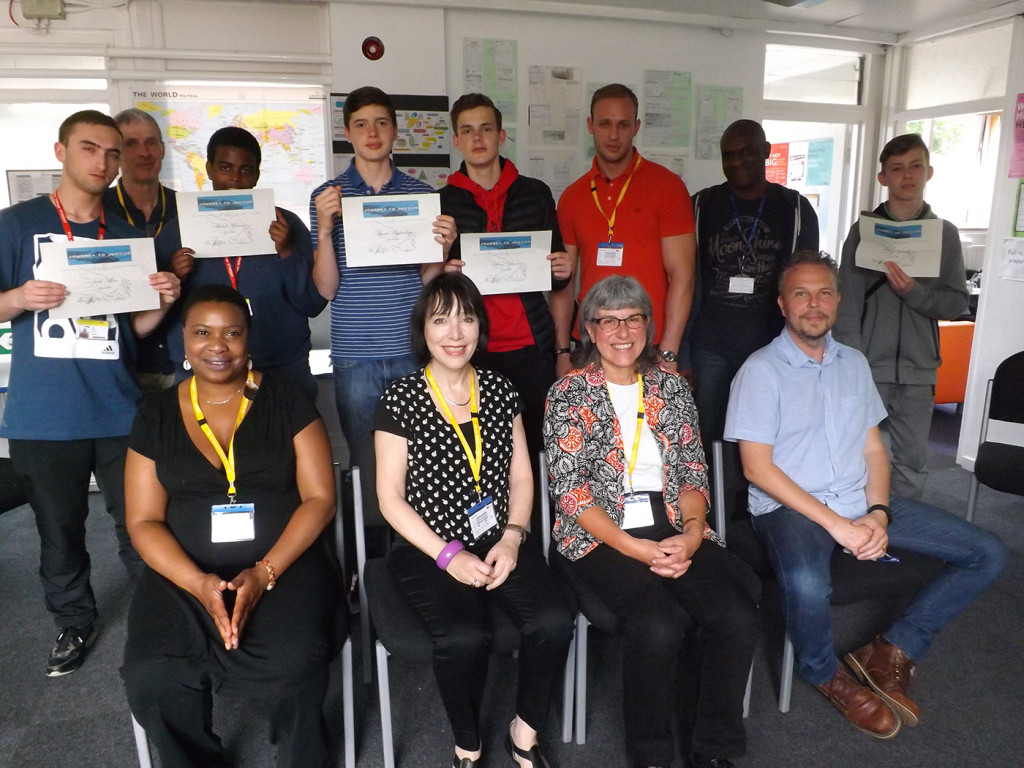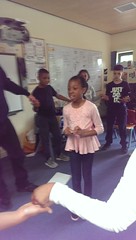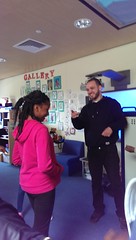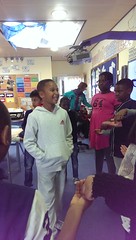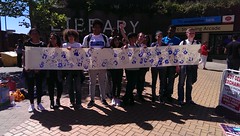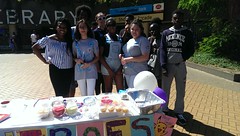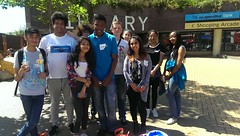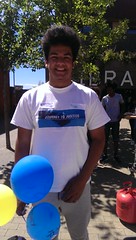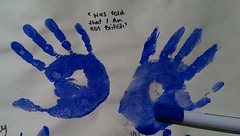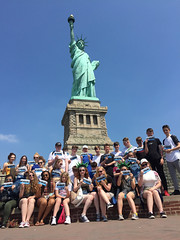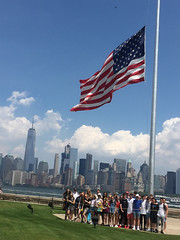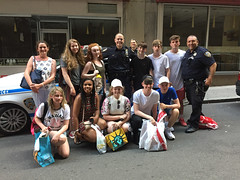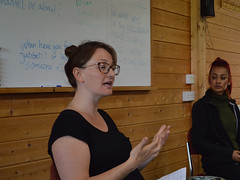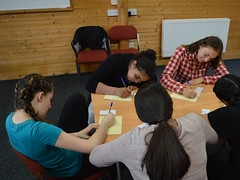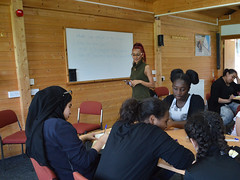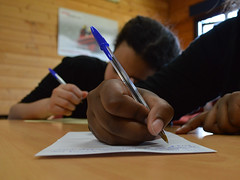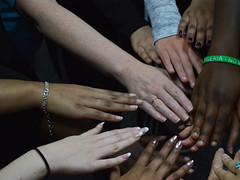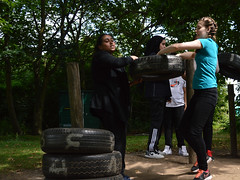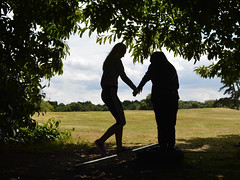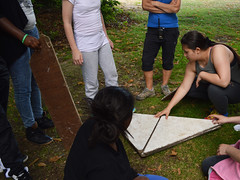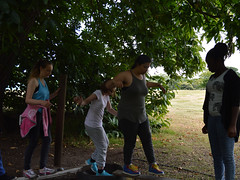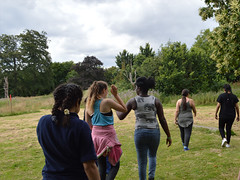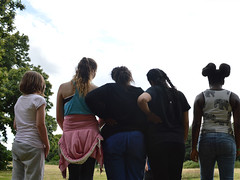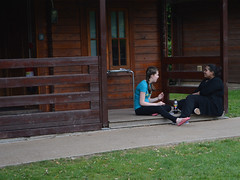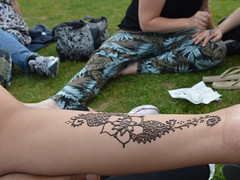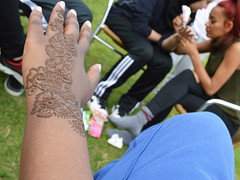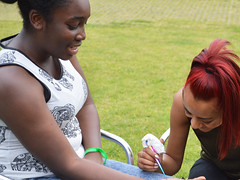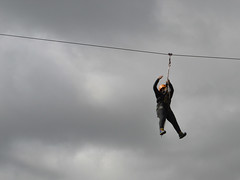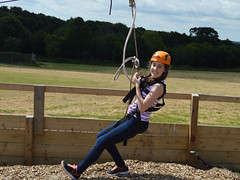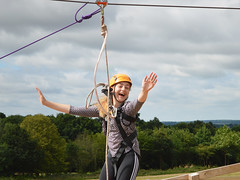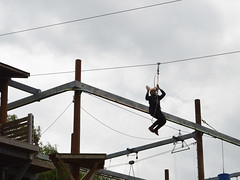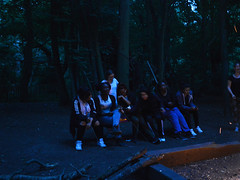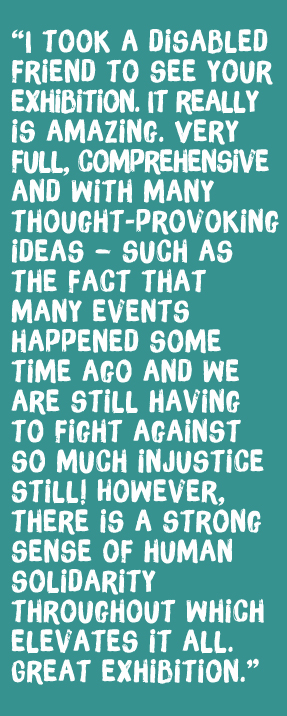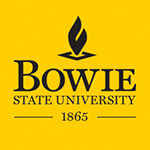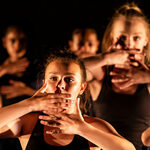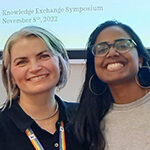Training Programmes
JtoJ Training Film
See our training film featuring workshops for teachers, youth and community workers and students, recorded at the Brady Centre, Tower Hamlets, east London in December 2016:
Peace assemblies in Islington schools, September 2019
JtoJ with Islington Faiths Forum
Kindly invited by Islington Faiths Forum to deliver their Peace Assemblies in September 2019, we were lucky enough to meet and engage with3,382 children and 262 school staff membersin sixteen primary and special schools. We shared stories and ideas about what peace means to us and how we can work together and be activists for peace. We wanted children to see themselves as already taking action and to think about what more they can do. Our assemblies were very interactive, using our storytelling approach. It was great to work as a team planning and delivering the assemblies, and to do so alongside excellent speakers from some of the many local faith communities.
Feedback from schools was extremely positive. Here are some examples:
‘The use of story was particularly effective in sharing the messages, as was the involvement and celebration of a number of different faiths and traditions. Encouraging children to be proactive and take responsibility for making their own changes was also effective and chimed particularly well with our current school focus – especially in such important and currently relevant areas like climate change and border control/immigration.’ (Primary school)
‘We thought the way that the fable, the inter-faith element and the Journeys for Justice issues were tied together was excellent and really engaged the children. It was a fantastic way to weave together the beliefs of different religions with the basic rules of living and respecting other people.’ (Primary school)
‘Really positive feedback for the assembly. The content was good and the level was accessible to our pupils. Great opportunities for them to join in and contribute.’ (Secondary special school)
“It was fabulous. The kids were impeccable because they were engaged in the assembly right from the start. The speakers took risks and the children responded beautifully. The speakers were kind and knowledgeable and made it obvious to my kids that they cared about their opinion. I want them back tomorrow. It was fun learning at its best. Please let me know when we can book you again. We just loved it. … Wonderful. It made a tough week special. ‘ (Primary pupil referral unit)
The team delivering the assemblies were Tania Aubeelack, Pat Boyer, Caroline Kamana and Martin Spafford. Warmest thanks to Roz Miller from Islington Faiths Forum for inviting us and such outstanding organisation; and to Islington SACRE for funding the project.
The Assembly Plan
Music as students enter: ‘Bayini’ by Gurrumul
Introduction by inter faith speakers, Islington Faiths Forum (10 mins)
What does peace mean to me? (Journey to Justice)
1. We introduce JtoJ and ourselves and ask the students:
- How did the music make you feel?
- What does ‘peace’ mean to you?
Peace is not just absence of conflict. There is much more to it than that, as we’ll show with some stories. (1 min)
2. The importance of cooperation. Aesop’s Bundle of Sticks fable (3 mins)
Props:
JtoJ banner (on display at back of stage/assembly area);
Piece of beautiful woven material (on easel at front of assembly);
Sticks – 10 thin twigs
Here is our first story. I need 5 children to help me tell the story.’ (Adult picks 5 children from audience)
Adult taking assembly: One day three young people were arguing in front of a piece of beautiful woven cloth.
Child One (repeating storyteller’s words): I’m the most important because I did the weaving!
Child Two: No! I’m the most important because I dyed the wool to make the beautiful colours!
Child Three and Four: If it wasn’t for the wool from our sheep, there wouldn’t have been any cloth! We’re the most important!
Enter mother (5th child from audience): Stop arguing children! I’m going to teach you all a lesson.
Gives each child a twig; then goes to each child in turn and breaks the twigs one by one. Children look confused. She then gives each child another twig, collects them and puts them together in a bundle. Asks one or two of the children to try and break the bundle of twigs. They can’t.
Mother: Don’t you see! Together you are strong; you cannot be broken. Together you have created something beautiful!
Ask young people in audience: What did you learn from this short story?
Elicit replies such as: Working together you can produce something good. Co-operation can produce more than working alone. If you work on your own you can be beaten (defeated or other……) Solidarity is very important…..
Explain how the JtoJ banner was produced as a result of co-operation from around the world.
If time, explain this story has been told for over a thousand years by Aesop, possibly an Ethiopian slave in Ancient Greece. Writers from the time say he was given his freedom because of the wonderful stories he told, stories which always taught ‘us people’ a lesson.
3. Working together, we can make a difference. Show (shortened) version of) ‘Your Shout’ – Forest Gate students’ anti-deportation campaign in 1996. What did peace mean to them? (2 mins)
4. A local story. Tricia Zipfel and Islington Play Association. Images on screen. Tease out the issues lack of access to play for poorer children and the right to decent housing. What did peace mean to these activists?(2 mins)
5. At this time of action on the climate emergency …
- What does peace mean for all life on this planet?
- How are people around the world taking action? Images of examples from the majority world (e.g. Malawi, Afghanistan, Brazil…?)
- As our name implies, we at JtoJ care about justice. Without justice and human rights there cannot be peace.
- Coming together we can and do make a difference. What are we already doing in school, at home? What more can we do? (2 mins)
Workshops at Little Ilford School, Newham
Exploring Fundamental British Values – the JtoJ approach
In March 2019 we were invited by Little Ilford School in Newham, east London to deliver workshops to Year 7 classes during their Drop Day on Fundamental British Values. We saw five different classes for one hour each.
We were aware of controversy surrounding the FBVs (are they not universal human values?) but decided rather to use some of the stories from our Newham exhibition – both local and from the USA – to tease out some of the complexities and nuances embedded in those values, particularly when people are taking action for human rights and social justice. What happens when one person’s individual rights threaten the rights of another? Is it justified to break an unjust law?
We wanted to generate thoughtful, open-ended and lively discussion and were very impressed indeed with the confidence and humanity shown by these twelve-year-olds when handling complex and controversial issues: a testament to the school’s work in encouraging safe environments for such discussions.
We started with the true story of a 1982 incident in their own school, a racist incident when men broke in at lunchtime and started attacking Asian children. One who fought back was arrested and this story led on to the events which became known as Newham 8. It raised the question of whether a violent response in self defence was justified.
We then broke the class into six groups, each looking at a different story, prompted by questions for discussion. Towards the end of the session we teased out issues from some of the stories in the whole group. We had film clips available for all the stories.
The stories we used were:
- Newham: Let Natasha Stay, Newham 8, Nasreen
- London: Asquith Xavier
- USA: Keshia Thomas, Ruby Bridges and Barbara Henry
In this mixed, secular school one of the most interesting discussions arose from the story of Ruby Bridges and Barbara Henry: clear that they disapproved of schools segregated on racial grounds, students were more divided when it came to the school segregation – by gender, faith and wealth – practised in the present-day UK.
While the stories we used were fairly specific to Newham, we feel a similar approach could be used with different stories in other locations.
Our thanks to Rabia Amin and all at Little Ilford School. The workshops were delivered by Ema Jackson and Martin Spafford with the help of staff at the school.
The stories and the ‘Holding to your values’ question sheets are all in the Training Resources section of our website.
Sir George Monoux Sixth Form College Waltham Forest, London, 2017-2018
Journey to Justice is about galvanising people to take action for social justice, but it is often hard to identify whether and how this has taken place. Our project at Sir George Monoux Sixth Form College in Waltham Forest (2017-2018) enabled us to see the process happening and how positive the outcomes can be.
Monoux JtoJ was initiated by Head of Sociology Marion Permaul and her colleague Jannine Jacobs-Roth after Marion had been inspired by our Train the Trainers day. The aim was for students to identify an issue they cared about and then plan and carry out an action of some form. After an introductory story-telling sessions by JtoJ volunteers Tania and Martin – full of examples of people taking action in their communities – students got to work.
Husna, Enitan, Faduma, Ozlem, Sabeehah and Muskan wanted to do something practical and preventative about homelessness:
“So we began putting ideas together and discussing exactly how we were going to target that issue. After a lot of research, thought and discussion we realised that the main cause of homelessness for women and children was domestic violence and abusive relationships, which resulted in them leaving abusers and ending up on the street. Therefore, we believed it would make more sense to target the cause of the problem rather than homelessness itself …
We first thought we could hold an event for mothers and children in our college hall … [but] … there were practical problems as well as safeguarding issues; we wanted out project to be smart and realistic … [so] … we really started to dig deeper into how to tackle the issue of domestic violence. Finally we had it: we thought that we could educate young boys and girls in relationships, helping them to see what is healthy and what isn’t and the dangers of an unhealthy relationship.”
They felt they should get young people to think about how they handle relationships and what goes wrong that leads to abuse in the home. Evidence suggests that gendered abuse can start very young, between siblings and influenced by adult behaviour. So they planned an awareness- raising lesson for schools and took it to Year 9 classes in two local schools. Their aim was to help younger students to understand the seriousness of the problem and get them thinking about how they relate to friends and partners. With the help of games, a quiz, group discussion and film they discussed coercive control as well as emotional, physical, sexual, financial and online abuse. They also gave out handouts with addresses to contact in case of need.
Responses from Year 9s were overwhelmingly positive. Here are some of their comments:
“I learnt quite a lot of new facts about domestic violence and how it’s not only affecting women, but also men.”
“I learnt how to understand the different types of domestic violence and where to go.”
“The goal was to have an understanding … so we don’t end up in the same situation.”
“There should be more types of session like this.”
“I think it’s pretty cool how students just a few years older than me start a little organisation.”
After the session in one school, the head of year wrote back:
“The students found it really interesting and informative. I would love for you to come back and deliver to my other two form groups.”
Gulsah, Mustafa, Amy, Tasnia, Sanjida and Salma were concerned at the rise of Islamophobia and how it was affecting British Muslims’ feeling of belonging. They ran a poster campaign based on the message ‘We can’t let the myths about faiths destroy our common humanity’, to generate discussion among their peers across the college.
Amar, Imaan, Kameron, Melodie, Sophia, Taylor and Rebecca were worried by the low level of sexual health understanding among their fellow students and felt this needed to be tackled. Kameron explains what they did:
“In February the sexual health nurse came into the college and we, as sexual health mentors, went in and helped provide students with condom cards and the ability to take tests for chlamydia. Which may have seemed embarrassing to the students that took the free test but once we explained to them that there are no common symptoms for it they agreed. I feel like overall we achieved our objective because we informed a sufficient amount of people about sexual health and encouraged them to be safe when having sex.”
Taylor adds:
“Regarding the future of our journey to justice, we have been appointed as sexual health student mentors , we hope to take part in future pathway assemblies and continue to educate others on safe sex. We also plan on assisting the college sexual health nurse during her future campaigns and presentations as a way of involving ourselves further into the community and increasing recognition and knowledge of safe sex.”
Mental health and schizophrenia was the issue of concern for Jada and Ksanet so they carried out a questionnaire in college and developed materials for use in assemblies. While they did not manage to use the materials, they did comment that the project had helped them gain more knowledge so they feel far better informed about mental health awareness.
Another student, meanwhile, shared her experience:
“I’m an 18 year old and … if I were to come out as bisexual I would be made homeless. Due to faith reasons my family think that loving people regardless of gender is sin, there are very few places in which I know I am safe to be completely myself…
In college there are certain groups of people I can come out to, however that’s not the case for everyone. If I were to come out to everyone I feel there could be a lack of security due to people’s conflicting views. This could lead to me constantly having to defend my sexuality without any support, something I shouldn’t have to do…”
She took the lead in organising the first Pride event in college. As one of her teachers commented:
“College staff have been grateful for LGBTQ students in telling us what we can do better …In February, we held our first Monoux Pride – an event for LGTBQ students to loudly say ‘we’re here!’ and for allies to loudly say ‘we’re here for you!’ One of my favourite aspects of Pride was how students who hadn’t intended to be part of it, were happy to stay. … it seems the large majority of our students – from all faith backgrounds – are keen to be allies, whether they are LGBTQ themselves or not.”
The project happened thanks to the energy and commitment of Marion and Jannine working closely with JtoJ’s Martin and Tania. Thanks also to Vice Principal James Massara who has enabled strong support from the college leadership. He commented that students involved had performed outstandingly in leadership interviews.
We are delighted JtoJ was invited to help plan the same approach for a second year, this time coordinated by Monoux staff members Carol Green and Marcus Burke. Students are designing actions on mental health, LGBTQ+ awareness and knife crime. Our hope is that the project will be a permanent part of college life. More news to come!
They celebrated their achievements on June 20th 2018
The project galvanised sixth formers to take action on LGBTQ, schizophrenia and Islamophobia (awareness raising); domestic abuse (teaching sessions with Y9 classes in two schools); safe sex (working with a nurse to help run clinics in college). Students received JtoJ certificates, several college staff attended and the college is committed to continuing the project next year. Staff commented that students involved had performed outstandingly in leadership interviews. Special credit due to Monoux sociology teachers Marion and Janine and to Martin and Tania for JtoJ.
Challenge Prejudice and Hate Crime
Watch a film made by young people living in Richmond and Kingston who attend Ham Youth Centre. They have been appalled by the wave of prejudice and venom unleashed by events in the last couple of years. They wanted to make a film which could be used to raise awareness amongst their peers to enable them to reflect on essential issues like stereotyping, being a critical consumer of information and the portrayal of refugees. They also helped to create a resource pack with group work activities that schools or youth clubs could use to explore these issues further. (Ben Skelton, Youth Worker, Richmond). Some of the activities were based on those used at a JtoJ Train the Trainers course.
Sixth Form workshops at Norbury Manor Business & Enterprise College, Croydon, March 7th 2017
We were delighted to be invited to run a day on the US civil rights movement for Sixth Form History students at Norbury Manor.
JtoJ friend and volunteer Celina Dunlop (UK representative of the Rosa and Raymond Parks Institute) told them to the ‘real’ story of Rosa Parks who was a lifelong, radical activist and was not in fact the first African-American who refused to give up her seat to white person. The Norbury students were also introduced to Jo Ann Robinson, a Montgomery resident who had spent years planning a bus boycott against racist practices and had leaflets ready prepared! Celina shared her fantastic collection of original artefacts from the period – magazines, badges, leaflets and Ku Klux Klan outfits.
Carrie Supple outlined the work of Journey to Justice and ran activities linked to one of the stories we tell in our exhibition, of Janice Wesley, a 14-year old school student who joined the 1063 Birmingham Children’s ‘Crusade’. 1,000 school pupils marched for equality in Birmingham, Alabama and were arrested, fire hosed and attacked:
I was very excited about participating. I realized the extent to which I had been unfairly treated and I wanted to do what I could to effect change in a positive way. One of the most significant memories I have is that of the music. “We Shall Overcome”! Sometimes I cry when I hear it, even today! The music was such an important part of conveying the message. It was inspiring and encouraging. I felt that God was on our side.
I did not realize it at the time, but we made a significant contribution to human rights around the world. It is something that I am VERY proud of today.
Change happens slowly, but it takes persistence, perseverance and sacrifice. Some of the battles were won because innocent blood was shed. We paid a price for the freedoms that were obtained; some of us were bitten by dogs, some were hosed, many others were jailed. Six innocent young people died. Freedom was not free!
The last session of the morning was led by Eliza Rebeiro, Director of Lives Not Knives: http://livesnotknives.org/ Eliza told us the remarkable story of why she founded LNK aged 14 and all they have achieved since. She asked the students to discuss in groups which issues they would choose to campaign on and explain why and how. The feedback was fantastic, with well thought through ideas focused on e.g.: violence against women and the lack of student voice in schools
After lunch Sarah Thompson, Head of History, who organised the day, showed Freedom Summer, Mississippi 1964, a film directed by Stanley Nelson (Freedom Riders, The Murder of Emmett Till) about patient and long-term efforts by outside activists and local citizens in Mississippi to organise communities and register Black voters in the face of intimidation, violence and death.
In their evaluation of the day, Norbury students, when asked for highlights, said:
The Ruby Bridges story, I didn’t know about it before& was surprised how the teacher helped her.
When we saw the artefacts, a snapshot of what people from the past read and seeing their point of view. Seeing the KKK uniform was very memorable. I have never been able to touch them.
Lives Not Knives.
Using History for inspiration, to make a change.
How much people I associate with feel the same way about certain topics and that we can actually make a change.
That there was more to the Rosa Parks story.
How big the movement was and what people did. I learnt how there were many people behind the famous figures who were supporting them.
Ark Academy, Brent, North West London
Journey to Justice workshops with Year Nine, March 2017
Joseph Coward, a History teacher at Ark Academy in Brent found JtoJ via our website. He wrote:
“I was keen to find a museum / outreach organisation which teaches the history of the US Civil Rights Movement. We wanted a cross-curricular event that both increased students’ knowledge of History and increased their engagement in citizenship and social justice.”
After careful planning, JtoJ’s Martin Spafford, Rosaleen Lyons and Tania Aubeelack went to Ark Academy to run 55 minute sessions for 8 groups of Year 9 students over two mornings.
They told the story of the 1968 Memphis sanitation workers’ strike, ending with a clip of Elmore Nickleberry describing their working conditions:
In groups, students then learned about Ruby Bridges and Barbara Henry – a story of school desegregation in 1960s New Orleans full of violence and bravery and about British child migrants to Australia between the 1920s and 60s. All three of which involved successful campaigns for justice.
They asked students: What qualities did campaigners need to have and what factors were needed to succeed? The facilitators then asked pupils to connect those examples from history to two disturbing contemporary cases: a student in Leicester who took his own life because of online bullying and children seeking asylum in Australia who are stuck in the grim conditions of a refugee camp on the island of Nauru. Students had to consider what the objectives of a campaign might be, who a campaign might be aimed at and what factors would be needed for it to succeed.
“The sessions were a great success. So many students were incredibly engaged.” (Joseph Coward)
Journey To Justice at the Five Nations Conference, Dublin, January 2017
Martin Spafford and Parul Motin on JtoJ as transformative education.
The conference was superbly and tightly organised in a lovely hotel, everything running super smoothly. More important than that, there was very quickly a coming together in solidarity and warmth of like minded people who are really out there trying to do transformative things in classrooms with bravery, creativity, skill and respect for young people in a wide range of very different contexts. Most of all was the quality of discussion and exploration of how to encourage social action in the current climate and the challenges facing educators. We were grappling with complexity with a lot of realism but also positivity and some optimism. Delegates were very diverse indeed in terms of age but not at all diverse ethnically: two Asian teachers and one of mixed heritage, otherwise all White. Some of the best moments, as always, were the discussions over the (delicious) meals and long into the night at the nearby canalside pub. We made some good friends.
As we were running a workshop we sadly couldn’t go to the other workshops, but the inspired idea of having an artist to create a visual report as we went along means you can see lots that emerged from the attached photos of what he produced. There were two excellent country-based discussion sessions – we were in the England group – the second of which, particularly, had us grappling with how to preserve the teaching of liberal values in a rightward-moving political climate. As one person said, ‘What if successful work encouraging students to be active in organising for change means that one group of students wants to organise a campaign to stop immigration?’ Of the plenary sessions, a real highlight was the one chaired by Lee Jerome in which four teachers in English schools reported on ways they had tackled the Prevent agenda in a Five Nations sponsored project which started from seeing Prevent itself as a controversial issue.
Both our workshops were very well attended and went very well though with more time for discussion in the second one. We generated really good discussion about the role of the arts and the power of stories from history. I think we managed to get a real understanding of how we connect history, the arts and social action in ways that can be transformative for young people and were therefore very keyed into the theme of the conference. We made new contacts in the five nations and will follow up with them. Without reservation, a fantastic conference, really impressive in its organisation, scope and sense of solidarity while realistic about the challenges ahead.
I left there feeling inspired and with a sense of pride. I was proud of the work we have done so far and achieved in such a short amount of time. We were praised and applauded as a team for our work and commitment to help support young people find their voices in the most creative way. I met some wonderful people, whose stories I will always remember to help me through my own struggles working with young people. The room was full of richness, people’s stories, backgrounds and practices – we were all learning and growing together. No one was patronised or belittled.
‘A fascinating project. Well done to you all’; ‘Amazing workshop. Love the way you ask students how the different civil right activists achieved change and about the obstacles they overcame.’ ‘Inspired by the young people’s sadness, anger, lessons they learnt and their voice of hope.’; ‘Fantastic to see the transformative and empowering work. Thanks for sharing.’ ; ‘Loved it all! INSPIRATIONAL.’ Martin’s going to work with Citizenship PGCE students at Middlesex University as a result.
Human Rights presentation at the City Law School in London by JtoJ volunteer Michael Asamoah
Journey to Justice volunteers gave a presentation on the work of Journey to Justice and its connection with human rights at The City Law School in London, England on Monday 27th November 2017 for students interested in this topic. The presentation was focused on the need for a society that is healthy and prosperous, the impact unfair treatment has had on people in the past, and the activities people have undertaken to create equality within society.
Educating people on equality is important as this could assist people in achieving their aspirations and in developing healthy and successful communities. The impact of unfair treatment – based on gender, age, race and religion – could result in poor health within communities. Fair treatment within communities makes them a better place to live in as this prevents prejudice and discrimination from occurring.
As a result of this well attended session several students expressed interest in hearing more and, in some cases, becoming Journey to Justice volunteers.
Alternative Provision at CandI
(City and Islington College), June 2016
In June 2016 JtoJ facilitators worked with nine young people at CandI. In prior discussion with us they identified their lack of confidence in interviews and belief that employers would not want to hire them. Our focus, therefore, was on developing confidence and skills. As a starting point we used stories of campaigns for justice including the Hillsborough Families and British children forcibly migrated to Australia in the 1950s and 1960s. We shared examples of music and spoken word about overcoming challenges (Suli Breaks, MC Naga, Sam Cooke) and identified their own positive qualities. The students also shared their own choices including Akala and South London rapper Dave. We then worked with them individually and in small groups so that each young person could develop a strong body of truthful, positive achievements, skills and values they could back up with evidence from their own lives. Their challenge was to undergo a formal professional interview and communicate those skills successfully.
On the last day, people from the worlds of journalism, advertising, business and education interviewed them and fed back their highly positive observations to each young person. All those interviewed achieved a 4 or 5 for employability (where 5 was the highest). Not only had they proved to themselves that they could successfully impress employers, but they had brought from hibernation strongly positive aspects of their own personalities that they could be proud of and express with confidence.
“You guys gave us confidence to do well, despite our incidents at school… It’s given me motivation to do more about what I want for my future.” “Justice doesn’t just come. You go through trials, that’s part of the road.” “We can make a change by promoting equality and telling younger people about these stories, so they can learn from them. We have to stick up for each other.” “Everyone had fun. Journey to Justice people made us feel at ease and cared for us, you didn’t judge us.”
SHINE Brixton Saturday School, June 2016
JtoJ facilitators worked with young people at SHINE Brixton in Christ Church Primary School under their Be the Change theme. We introduced them to the meaning of social justice and human rights, to the music of social protest and to Ruby Bridges and Barbara Henry who stood up against racism. The group worked with Ryan from Poetic Unity, looking at the power of poetry to inspire social change. Ryan raises funds for the Alzheimer’s Society.
“Ruby inspired me because she stood up to the crowd. She never gave up and never missed school …[I was inspired by] Barbara Henry – because she was the one who taught Ruby when all the white parents wanted Ruby out of the school.” “Akala – because he wants to change the world with his music.” “Ryan is a role model – a great example of someone dealing with someone else’ suffering.”
Ryan from Poetic Unity with SHINE Brixton students
National Citizen Service – The Challenge,
July 2016
Seven JtoJ volunteers, including three graduates of NCS 2015 ran sessions with a group of teenagers in Haringey to develop a publicity plan ready for the arrival of our exhibition programme in Tower Hamlets in December 2016. They organised a sponsored walk for us and a brilliant campaign day to raise awareness – asking shoppers in Wood Green to leave a handprint and share their stories of injustice.
“I’ve learnt more about working for social justice – young people should be speaking out more.” “It made me realise how much social injustice is still going on in the world.”” We need to be more accepting to change and difference.” “It has made me open my eyes to the bigger world.”
Summerfield Group at the National Citizen Service – The Challenge in Wood Green campaigning for Journey to Justice #setyourstoryfree
Thornhill School, Sunderland, July 2016
Thornhill School is one of JtoJ’s partners in Sunderland. Its music department staff took 32 students to New York City. This chance of a lifetime visit enabled the young people to visit iconic sites – the Statue of Liberty, Empire State Building, Central Station, Central Park and the stunning 911 memorial. The photo of the group on Ellis Island is a reminder of the troubled times currently in America. Sunderland was featured in a New York Times article after Brexit and students wanted to make clear their support for the work of JtoJ and our focus on human rights and social justice.
Students of Thornhill School, Sunderland supporting JtoJ in NYC!
Girlz United, Shadwell, Tower Hamlets, east London July 2016
JtoJ partner Girlz United – a young women’s community group with Muslim members – were keen to meet their peers from backgrounds different to their own and to learn about the local East End history of struggles against racism. Julie Begum, Chair of the Swadhinata Trust, met the girls in early July to talk about her role in Women Unite Against Racism in the 1990s and about the murder of Altab Ali in 1978. On July 15th-17th Girlz United went away with members of Hawkwell Girls Brigade, Essex and Brandon Baptist Church, Camberwell for a residential weekend in Danbury, Essex thanks to a grant from the US Embassy, London. Led by youth workers and facilitators, Leanne Sedin, Liz Anderson, Parul Motin and Sally Claydon they focused on questions of identity, social justice and team building, producing beautiful poems for our exhibition in December.
“What we’ve done together this weekend is important not only through the practical activities, I also gained knowledge and it’s inspired me to become more of an active person and to start taking more interest in my own community and value every piece of it.” “Without programmes like this people are unable to understand why people are racist..It is fear of the unknown.” “We learnt that we all have a voice. It’s just what we do with it that can make a difference.” “This project has been so emotionally powerful.””This weekend shows how people don’t all have to be the same to get on which is something I rarely see at school.”
Be The Change Drop Day at Northumberland Park Community School, Tottenham, London July 2015 and 2016
“Be the change that you wish to see in the world.” (Mahatma Gandhi)
Journey to Justice was invited to run a session with students at NPCS in Tottenham as part of their Be the Change Day which aims to inspire and motivate students to make a difference through volunteering.
We talked about our work so far: in Leyton, the travelling exhibition, Newcastle and more and we discussed the factors which make human rights campaigns successful (or not) and asked them to describe issues they care about most. Their concerns include: equal education for girls world-wide; eradicate discrimination; homelessness; the need for peace and respect (‘don’t insult each other’, ‘be more positive’); more family time.
The young people outlined how being a volunteer can help achieve change and the range of skills needed. Then they worked in small groups; focused on helping plan our London launch of the travelling exhibition for 2016. The themes were: fundraising; PR & Communications and the line-up itself.
Feedback to the whole group was fantastic! Detailed, enthusiastic, thoughtful and invaluable. Happily for us, many students signed up to volunteer with JtoJ. It was a brilliant morning full of quality questions and responses. In their evaluations, students said:
‘I really enjoyed the class. I didn’t want to come because I thought it was going to be boring but I really learned things and understand that it’s in my hands and the hands of all people to make a difference. We just need to join together.’ (Ruth)
‘My favourite part of the day was when we planned next year’s show in London.’ (Kaan)
‘The part that I liked was when we were sharing things about our world that we would like to change.’ (Marianna)
‘I really enjoyed it when my group had to present our ideas for the launch.’ (Ryan)
‘I really enjoyed everything. I thought our session was well planned and there was nothing to improve. Everyone got involved and it was a fun experience I won’t forget.’ (Ketura)
Thank you very much staff and students of Northumberland Park Community School
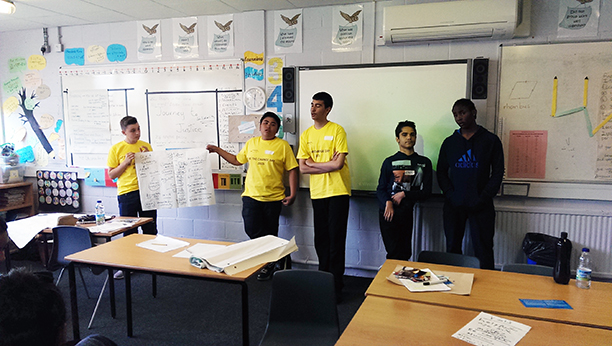
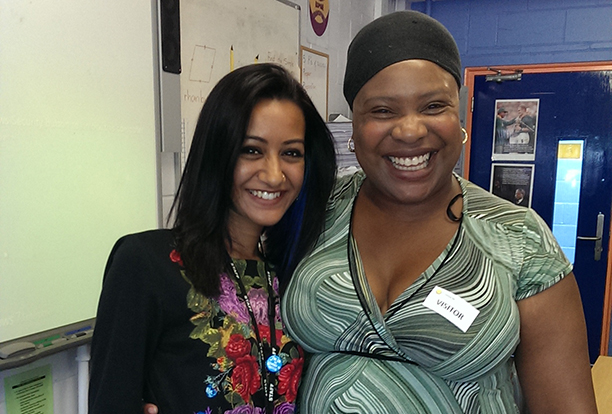
The following year in July 2016 we facilitated a workshop for 40 students from Years 7 and 9 as part of the Northumberland Park Community School ‘Be the Change Day’ again. We introduced the work of JtoJ through stories and film and then Diane, one of our volunteers, described her experiences as a volunteer with the National Citizen Service.
The task we set the students was to devise a fundraising day in a local park for a cause of their choice and plan the event, do the budgeting and design the merchandise. We wanted them to think about some different possible journeys to justice (their choices included combating bullying and racism, building a local youth centre and addressing the shortage of affordable housing). We also aimed to give them a feel for the challenges and sense of achievement in event organising, and hopefully to feel keen themselves to be volunteers on community schemes in the near future. At the end of the session nearly all indicated they would like to become volunteers.
